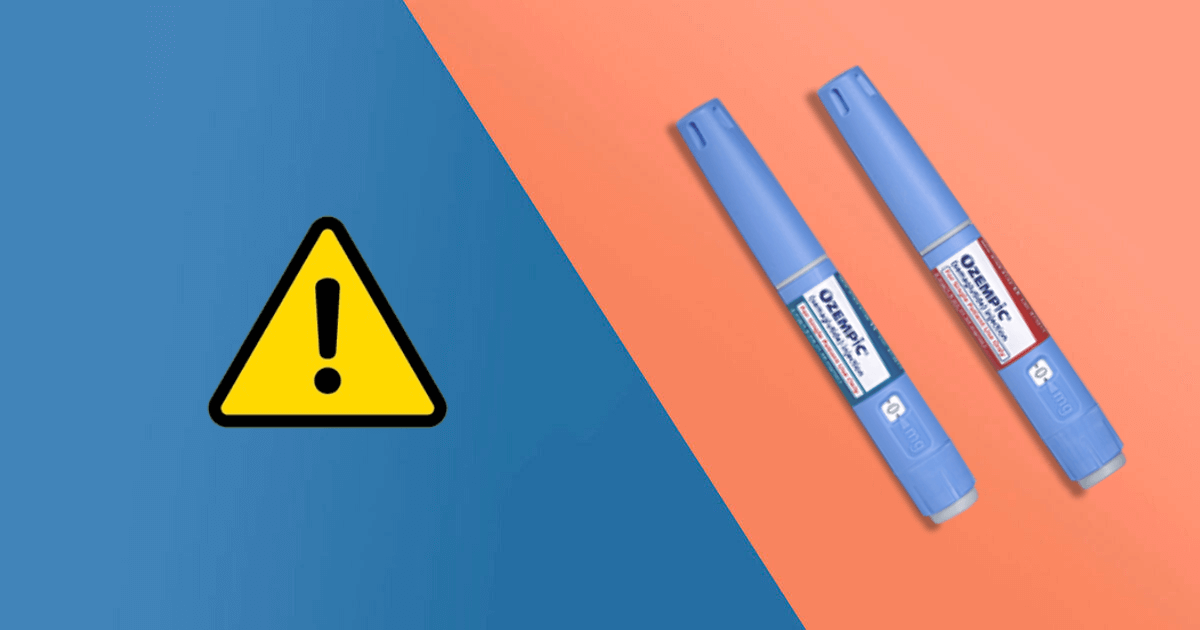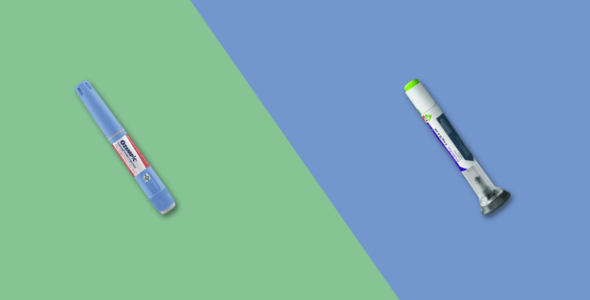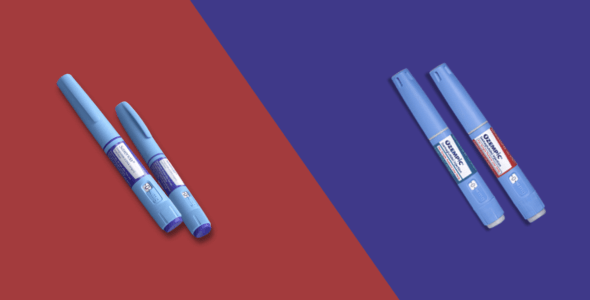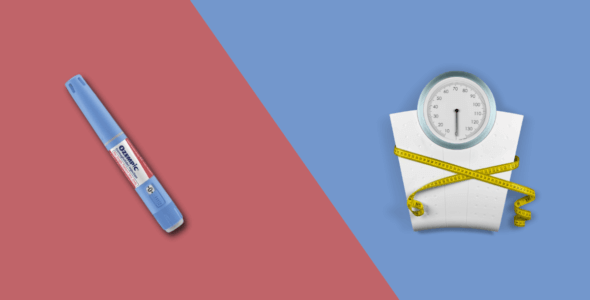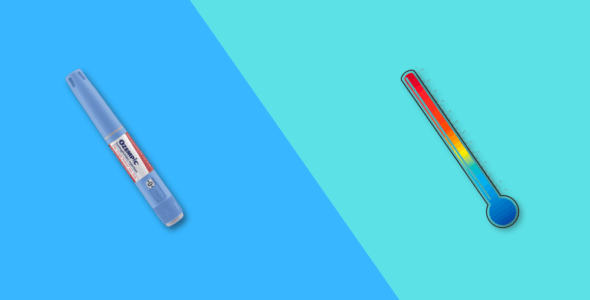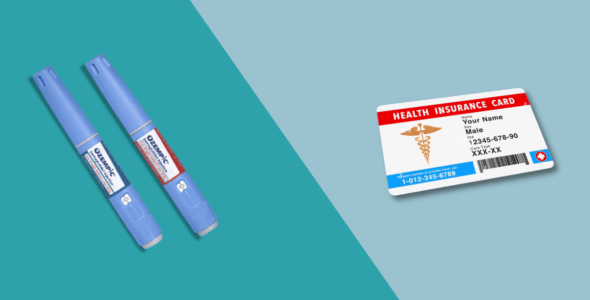Ozempic side effects and how to avoid them
Table of contents
Ozempic is used to control high blood sugar in people with type 2 diabetes mellitus. Just like other drugs, it can cause adverse reactions. The more common side effects of Ozempic tend to be diarrhea, nausea, vomiting, and stomach pain. It’s important to talk to your healthcare professional for medical advice about possible side effects that trouble you or are persistent. Learn more about Ozempic side effects and how to avoid them.
What is Ozempic?
Ozempic is an FDA-approved prescription drug made by Novo Nordisk. It is used for the treatment of type 2 diabetes to prevent blood sugar from rising after eating, by slowing the rate of digestion and the release of insulin in your body.
This medicine is also used to lower the risk of a heart attack in type 2 diabetics. It causes your pancreas to secrete more insulin, helping to lower your blood sugar and reduce your risk of major cardiovascular events, like heart attacks and strokes, if you have heart disease.
Ozempic can help you lower your blood sugar levels when used alongside dietary and lifestyle changes. Ozempic is not used to treat type 1 diabetes or diabetic ketoacidosis.
How does Ozempic work?
The active ingredient in Ozempic is semaglutide. It is classed as a glucagon-like peptide-1 receptor agonist (GLP-1 receptor agonist). Semaglutide reduces blood glucose through a mechanism where it stimulates insulin secretion and lowers glucagon secretion by selectively binding to and activating the GLP-1 receptor.
Unlike many other treatments for type 2 diabetes, semaglutide is not a type of insulin. It is a human hormone that acts on different parts of your body. Semaglutide encourages your pancreas to produce more insulin, helping to lower your blood sugar after you’ve eaten. It also appears to increase the growth of the cells in your pancreas that produce insulin (beta-cells).
The semaglutide injection is injected under the skin (subcutaneous) usually once every 7 days. The injection sites are the thigh, abdomen, or upper arm. The dose you receive is based on your medical condition and your response to treatment. If you miss your weekly dose of Ozempic and there are less than 3 days until your next dose, do not take the missed dose. The Ozempic injection can be stored at room temperature or in the refrigerator.
What happens if I miss a dose of Ozempic?
If you forget to take a dose of Ozempic, take it as soon as you remember. If, however it is nearly time for your next dose, do not take the missed dose. Take your next dose when you would normally take it. Do not double up your doses as this may risk an overdose.
Why have I been prescribed Ozempic?
Ozempic is a diabetes medication that is likely to have been prescribed because the combination of improving diet, increasing exercise, bodyweight reduction, and metformin medication has not achieved adequate blood sugar control for you.
Ozempic is not approved for people with type 1 diabetes and should not be taken by women who are pregnant or breastfeeding. Some of the advantages of taking Ozempic are suppression of hunger and modest weight loss, which are desirable for diabetics.
Do not use Ozempic if you have a personal or family history of thyroid tumors or thyroid cancer or if you have multiple endocrine neoplasia syndrome type 2.
Other common GLP-1 receptor agonists are:
- Tanzeum – albiglutide
- Trulicity – dulaglutide
- Byetta – exenatide
- Bydureon Bcise – exenatide extended-release
- Victoza – liraglutide
- Compounded Semaglutide
- Compounded Tirzepatide
Get your Ozempic medication for only $49 per month
Get StartedWhat are the side effects of Ozempic?
The most common side effects of Ozempic include:
- Nausea
- Vomiting
- Stomach pain
- Constipation
- Tiredness
- Diarrhea
- Reactions at the injection site
In rare instances, Ozempic can cause more serious side effects, including:
- An increased risk of thyroid tumors, symptoms such as hoarseness, a lump or swelling in the throat
- Kidney problems, including kidney failure
- Serious allergic reactions cause swelling under your skin, normally in your eyelids, lips, hands, or feet. Swelling of your mouth, tongue, or throat leading to shortness of breath
- Inflammation of your pancreas (pancreatitis). Symptoms of pancreatitis include severe abdominal pain/stomach pain, nausea/vomiting that doesn’t stop
- Changes in your vision
- Very low blood sugar (hypoglycemia) causing shakiness, fast heartbeat
For medical advice about side effects, talk with your health care provider and also read the medication guide and instructions for use that comes with Ozempic.
Does Ozempic cause weight loss?
Ozempic is not FDA-approved for weight loss but may reduce your appetite which will help you to lose weight. Patients taking Ozempic in combination with changes to diet and lifestyle will lose on average 14 lbs over 6 to 12 months.
RELATED: Ozempic for weight loss
How long do Ozempic side effects last?
Milder side effects should stop within a couple of weeks of treatment with Ozempic.
Does Ozempic cause hair loss?
Hair loss is not a side effect of taking Ozempic. Hair loss may however occur as a symptom of high blood sugar levels and diabetes. Speak to your healthcare professional if you have concerns about hair loss when using Ozempic.
Does Ozempic cause headaches?
Headaches are a symptom of low blood sugar levels (hypoglycemia). Ozempic may cause low blood sugar when taken in combination with other medication for the treatment of diabetes.
Does Ozempic cause fatigue?
Fatigue or tiredness is a side effect of Ozempic, affecting around 5 % of individuals. Ozempic causes a loss of appetite which reduces calorie consumption. The reduction in energy intake causes fatigue.
Does Ozempic affect your eyes?
Diabetic retinopathy is a condition caused by diabetes and high blood sugar levels that damages the retina at the back of the eye. Patients with diabetic retinopathy are at an increased risk of bleeding or swelling in the back of the eye when using Ozempic.
What are the bad side effects of Ozempic?
Serious side effects of Ozempic include an increased risk of thyroid tumors, kidney failure, severe life-threatening allergic reactions, pancreatitis, and hypoglycemia.
What is the biggest side effect of Ozempic?
The biggest and most serious side effect of Ozempic are life-threatening allergic reactions. Symptoms include swelling of the face, lips, tongue, or throat, trouble breathing, fainting, dizziness, or a very fast heart rate.
Why do I feel so sick on Ozempic?
Slowing down of gastric emptying, stomach upset, and nausea are common side effects of Ozempic and the class of drugs it belongs to. These side effects will normally go away within a couple of weeks of starting treatment with Ozempic. Eat smaller meals to help reduce symptoms of an upset stomach.
Why does Ozempic make you tired?
Ozempic will cause a loss of appetite which will reduce your calorie consumption. The reduction in your energy intake will make you feel tired.
Do Ozempic side effects go away?
Most side effects from Ozempic are short-term and mild. Most of these side effects should go away within a few days or a couple of weeks. If you experience side effects that will not go away, speak to your doctor for medical advice.
Ozempic drug interactions
- Any medications you take orally to reduce the risk of blood clots (oral anticoagulants) like warfarin
- Insulin – Ozempic can be used alongside insulin, but your doctor may change the dose of insulin you take and/or how often you use insulin
- Any other medications that are taken to treat type 2 diabetes
Ozempic warnings & precautions
Don’t take Ozempic if you:
- Are allergic to the active ingredient semaglutide, or any of the other ingredients in Ozempic
- Have had, or anyone in your family has had a type of thyroid cancer called medullary thyroid carcinoma (MTC)
- Have an endocrine system condition called multiple endocrine neoplasia syndrome type 2 (MEN 2)
- Have pancreatitis
- Have type 1 diabetes (Ozempic is for type 2 diabetes only)
- Are under 18 years of age
Talk to your doctor before taking Ozempic if you:
- Have had any problems with your kidneys or pancrease
- Have ever had diabetic retinopathy
- Are currently pregnant or are planning to become pregnant
- Are currently breastfeeding or are planning to breastfeed
Always speak to your healthcare professional for medical advice regarding drug interactions, taking supplements, taking over the counter (OTC) medications, and drinking alcohol when using Ozempic. Healthcare professionals are the most reliable and accurate source of drug information. They can also provide you with a medication guide for each drug you take.
How to avoid Ozempic side effects
1. Stick to the recommended dosage
Take your prescribed dose that has been recommended by your healthcare professional once per week, on the same day of the week, as a subcutaneous injection in the upper arm, abdomen, or thigh to prevent you from forgetting your dose. Taking your medication consistently will make a major difference in how well Ozempic will work for you.
Your healthcare professional may adjust the dose of Ozempic or your other medications to find the best dosage for your specific needs.
2. Rotating insulin injection sites
The importance of rotating insulin injection sites is to reduce reactions at the site of the injection, to maintain effective insulin absorption and reduce small fatty lumps or hard lumps that could develop in areas that are continuously used as injection sites. These can interfere with insulin absorption and also cause discomfort. Switching between injecting sites such as the left and right arm or right and left thigh, and moving injection sites within the area will help prevent problems.
3. Store Ozempic correctly
Ozempic should be stored correctly at room temperature (68 to 77 degrees Fahrenheit) and the needle disposed of correctly. Ozempic should be stored in a dry place in its original container.
Knowing how to store your prescription medication is essential in order to make sure the medication will remain as effective as possible. Using improperly stored or expired medication may result in the medication not working properly and potentially causing unwanted side effects.
RELATED: Does Ozempic need to be refrigerated?
4. Discuss medical history
Discussing your medical history with your healthcare professional is important to assist them understand how effectively Ozempic will work for you. Give a complete list of all the prescription drugs, including over-the-counter meds, supplements, and medical conditions you may have. Talking with your healthcare provider will allow them to pick up any drug interactions with Ozempic and help manage any side effects.
5. Reduce alcohol intake
Excessive alcohol intake increases your chance of developing chronic inflammation of the pancreas called pancreatitis. This condition leads to permanent damage to the pancreas and its ability to manage the production, storage, and release of insulin.
If you are planning to drink alcohol and you have diabetes, aim to always stay within the recommended guidelines. This is the safest way to drink alcohol.
6. Pay attention to your body
Paying attention to how your body feels when taking Ozempic is important, as uncontrolled blood sugar can be fatal. Seek immediate medical attention if you feel your blood sugar levels are uncontrolled. Talk to your doctor straight away if you start experiencing any side effects of Ozempic when taking it, and if you feel the medication is not working for you.
Medically reviewed
A medical professional has reviewed this article.


Jamie Winn, PharmD
Jamie Winn, PharmD
Dr. Jamie Winn received his Doctor of Pharmacy in 2002 from the University of South Carolina College of Pharmacy, Columbia, SC. Jamie is a medical reviewer for NiceRx.

